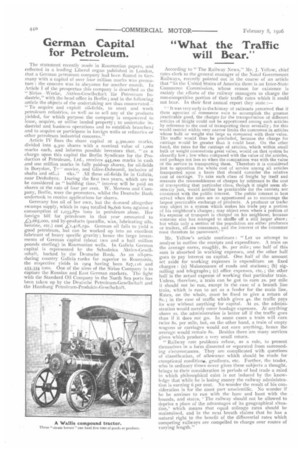"What the Traffic will Bear."
Page 16

If you've noticed an error in this article please click here to report it so we can fix it.
According to " The Railway News," Mr. J. Yellow, chief rates clerk to the general manager of the Natal Government Railways, recently pointed out in the course of an article that "In the United States of America there is an Inter-State Commerce Commission, whose reason for existence is mainly the efforts of the railway managers to charge the non-competitive portion of their traffic rates which it could not bear. In their first annual report they state :— " It was very early in the history of railroads perceived that if theSe agencies of commerce were to accomplish the greatest practicable good, the charges for the transportation of different articles of freight could not be apportioned among such articles by reference to the cost of transporting them severally; for this would restrict within very narrow limits the 'commerce in articles whose bulk or weight was large as compared with their value. The traffic would thus be precluded, because the charge for carriage would be greater than it could bear. On the other hand, the rates for the carriage of articles, which within small bulk or weight concentrate great value, would on that system be absurdly tow ; low when compared with the value of the articles, and perhaps not less so when the comparison was with the value of the service in transporting them. Therefore it is considered just to apportion the whole cost of service among all articles transported upon a basis that should consider the relative cost of carriage. To take each class of freight by itself and measure the reasonableness of charges by reference to the cost of transporting that particular class, though it might seem abstractly just, would neither be practicable for the carriers nor consistent with the public interest. The public interest is best served when the rates are so apportioned as to encourage the largest practicable exchange of products. A producer or trader may object to a system which makes his trade pay a portion of his neighbour's charges ; may object even where a portion of his expense of transport is charged on his neighbour, because someone else has managed to shuffle off a still larger share; hut while only a section of the popult-tion are either producers or traders, all-are consumers, and the interest of the consumer most therefore be paramount.'" Mr. Yellow's article continues : " Let us attempt to analyse in outline the receipts and expenditure. A train on the average earns, roughly, 8s. per mile ; one half of this sum is absorbed in working expenses, and the other half goes to pay interest on capital. One half of the amount set aside for working expenses is expenditure on fixed charges : (a) Maintenance of roads and stations ; (b) signalling and telegraphs; (e) office expenses, etc.; the other half is the actual expense of working that particular train. Unless, therefore, a train can be got to earn 25. per mile it should not be run, except in the case of a branch line train, which is run to act as a feeder for the main line. Rates, on the whole, must be fixed to give a return of 8s.; in the case of traffic which gives 4s. the traffic pays its way without anything for capital. At 2s. the administration would merely cover haulage expenses. At anything above 2s. the administration is better off if the traffic goes than if it does not go. In some cases a train will earn twice Ss. per mile, but, on the other hand, a train of empty wagons or carriages would not earn anything, hence the average would remain Ss. Besides there are many services given which produce a very small return.
" Railway rate problems refuse, as a rule, to present themselves in a form dissected or separated from surrounding circumstances. They are complicated with questions of classification, of allowance which should be made for exceptional condition', gradients, etc. Further, the trader, who in ordinary times never gives these subjects a thought, brings to their consideration in periods of bad trade a mind in which philosophical calm is not induced by the knowledge that while he is losing money the railway administration is earning 6 per cent. No wonder the result of his consideration is for the most part unscientific. No wonder if he be anxious to run with the hare and hunt with the hounds, and states, ' The railway should not be allowed to deprive a place of the advantages of its geographical situation,' which means that equal mileage rates should be maintained, and in the next breath claims that he has a natural right to the benefit of the differential rates which competing railways are compelled to charge over routes of varying length."




















